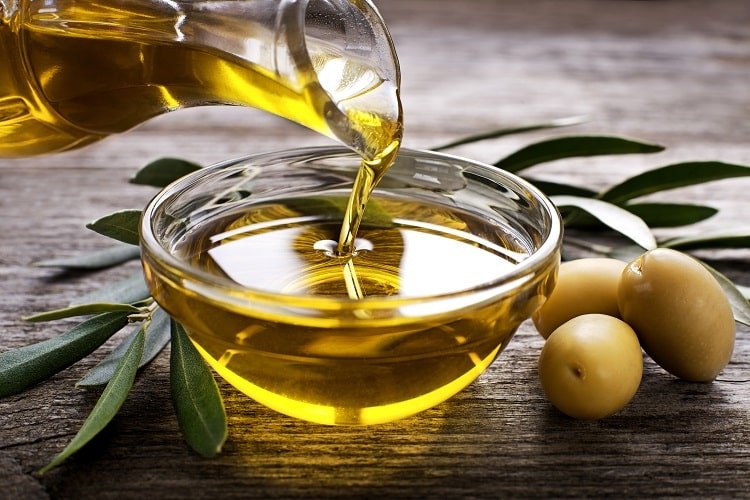
Compared to the rest of the population, veterans are more likely to deal with a variety of health conditions, including depression, anxiety, post-traumatic stress disorder, chronic pain, and traumatic brain injury. And these, in turn, may contribute to a range of other issues such as diabetes, heart disease, cancer, and dementia. It sounds kind of bleak when you put it that way, but the promising news is that many dietary and lifestyle changes can help boost both physical and emotional health, and may provide some level of relief. (Of course, you should still seek out the help of physicians and mental health professionals when needed.)
One dietary change that’s been proven, time and again, to improve nearly every aspect of health is the Mediterranean diet—and some nutrition experts believe that the Mediterranean diet’s high composition of healthy fats, including olive oil, is largely to thank.
Compared to other cooking oils, extra virgin olive oil is loaded with healthy polyphenol compounds, many of which have antioxidant properties. It also contains more monounsaturated fatty acids, which are known to be anti-inflammatory.
Here are 8 health benefits of olive oil that may be especially beneficial for veterans:
- It supports a healthy mood.
The brain-supporting polyphenol compounds in olive oil can actually help in elevating the mood. Studies (like these ones from 2010, 2017, and 2019) provide mounting evidence that Mediterranean diets may help with treating depression and easing anxiety—in one study, 30 percent of study participants went into remission from their depression after 12 weeks on the diet. Plus, the healthy fats in olive oil have been shown to support healthy functioning of the nervous system and increase levels of serotonin, the feel-good neurotransmitter.
- It boosts brain power and memory.
Extra virgin olive oil’s polyphenol compounds—specifically one called oleocanthal—act as powerful antioxidants that can help counteract the effects of oxidative stress and inflammation on the brain. Oxidative stress and inflammation are associated with memory-stealing neurodegenerative diseases like Alzheimer’s. In one study, oleocanthal-rich olive oil helped reduce neuroinflammation and restore blood-brain barrier functioning.
- It helps ease inflammation and pain.
Chronic inflammation is at the root of most chronic pain, including conditions like arthritis—and olive oil may help alleviate this for two reasons. Diets rich in monounsaturated fats (the main type of fat in olive oil) may reduce the levels of CRP or C-reactive protein, a marker of inflammation that’s typically elevated when the person is suffering from a condition like arthritis.
Additionally, the oleocanthal, a phenolic compound, has a similar mechanism of action as ibuprofen—it reduces the production of pro-inflammatory COX1 and COX2 enzymes to reduce pain. Experts estimate that around 3.5 tablespoons of EVOO are the equivalent of 200-mg of ibuprofen.
- It boosts cardiovascular health.
The U.S. Food and Drug Administration (FDA) says there’s good evidence to support the claim that consuming 1.5 tbsp of olive oil may reduce risk of coronary heart disease—as long as olive oil replaces other fats/oils in your diet that are higher in saturated fat, and as long as consuming more olive oil doesn’t increase the total number of calories you eat in a day. There’s also evidence linking olive oil to improvements in cholesterol levels and lower blood pressure.
- It may reduce risk of cancer.
Several healthy compounds found in olive oil (e.g. oleic acid, hydroxytyrosol, oleocanthal, phytosterols, squalene, and more) have been shown to possess anti-cancer properties. These compounds may be the reason research has found that women who eat the most olive oil tend to have a lower risk of breast and colon cancer. Cancer rates also tend to be lower (among men and women) in Mediterranean countries, where olive oil is most heavily consumed.
- It boosts the immune system.
If you want to avoid catching a cold, the flu, or COVID, it’s crucial to have a healthy immune system. The good news: the immune system likes olive oil. One recent study showed that consuming around 3 tbsp olive oil daily was linked to the increased T-cell activation. T-cell is a type of immune cell that helps fight off invading pathogens. Other fats like butter and vegetable oil don’t have the same effect.
- It helps prevent or manage diabetes.
Healthy fat sources—along with protein and fiber—are essential for anyone who’s trying to reduce risk of diabetes. In one study, people consumed more olive oil were reported to have lower blood sugar levels as well as a 16 percent lower likelihood of developing type 2 diabetes. Research suggests that olive oil’s monounsaturated fats may help protect people from insulin resistance.
- It helps with weight loss.
Repeat after me: Fat doesn’t make you fat. In fact, healthy fats like olive oil help ensure a stable blood sugar level, which can reduce cravings, help you feel more satisfied, and prevent overeating. One study found that even relatively high olive oil consumption (when eaten as part of a healthy Mediterranean diet) does not cause weight gain, and another study found that women who consumed 1 more tbsp of olive oil for breakfast lost more fat and experienced a greater blood pressure reduction than women who used soybean oil.
ATTENTION READERS
We See The World From All Sides and Want YOU To Be Fully InformedIn fact, intentional disinformation is a disgraceful scourge in media today. So to assuage any possible errant incorrect information posted herein, we strongly encourage you to seek corroboration from other non-VT sources before forming an educated opinion.
About VT - Policies & Disclosures - Comment Policy



